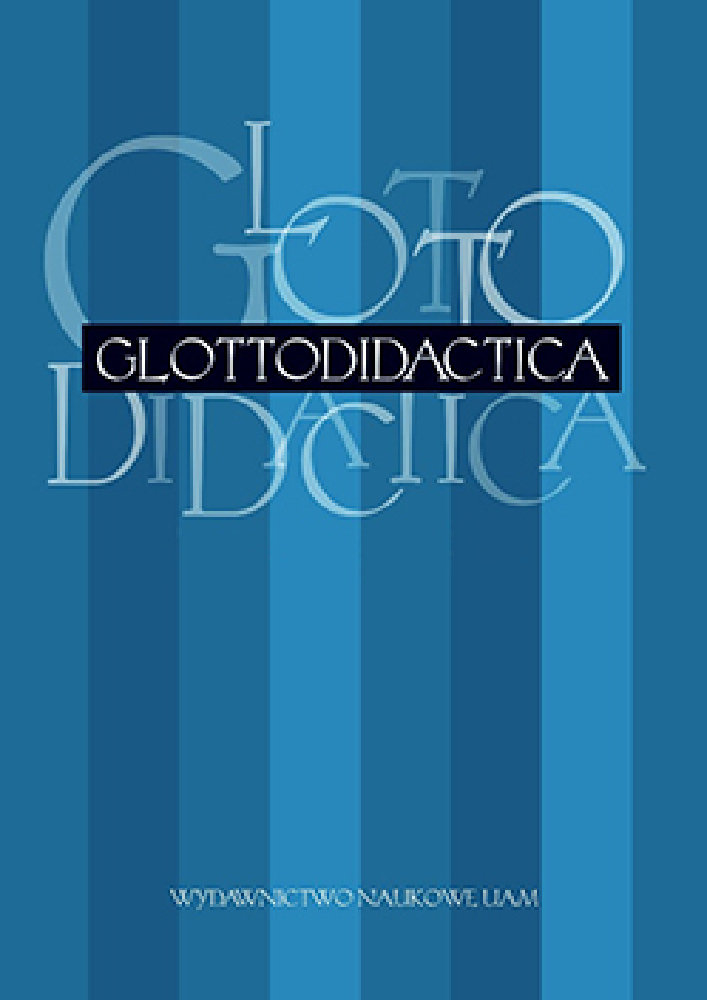Abstract
The aim of this paper is to show what sort of translation problems appear in the adjective-substantive collocations in Polish and German. A special class of collocations is represented by lexicalised and idiomatised syntagmas. These units include characteristic attributive perspectives specified by the two languages and the two culture communities. This phenomeneon refers to conventional valuing, attributions and métaphorisations of concepts represented in substantives used. In this way collocations form and fix the cultural profiles of reality. Because of that they can be regarded as cognitive formulas which need to be reprofiled in a concrete translation process through their projection on the target language and culture. As a result of these cognitive and linguistic operations the translator identifies the convergences and divergences as determined by the language system and the text between both the two languages. He secondly constructs equivalent attributive profile of the concept transferred into the target text, thus guaranteeing the reciprocity of perspectives between both of the texts. The essay classifies the cases and types of disparities between Polish and German adjeck-tive-substantive collocations, showing how they can be reprofiled according to linguistic and cultural requirements of the target text. This class of translation problems is only a subfield of the larger domain, but the main mechanism of the important translation transfer can be already demonstrated and exemplified basing on these specific translation units.
References
Bartmiński, J., 1993. O profilowaniu w słowniku etnolingwistycznym. In: Philologia slavica. K 70-letiju akademika N.I. Tolstogo. Moskwa, 12-19.
Czirko, L., 1989. Kookurretizanalyse der deutschen Gegenwartssprache. Studien zur deutschen Sprache. Bd. 16. Tübingen: G. Narr.
Czirko. L., 1997. Pronominale Attribute von Mann und Frau in der deutschen Schriftsprache. In: Sprachreport. Informationen und Meinungen zur deutschen Sprache. 12-14.
Dobrovolskij, A., 1998. Idiome im mentalen Lexikon. Ziele und Methoden der Phraseologie forschung. Trier: Wissenschaftlicher Verlag.
Gładysz, M., 1999. Lexikalische Kollokationen im Deutschen und Polnischen. Praca doktorska obroniona w Uniwersytecie Śląskim.
Gładysz, M., 1999. Didaktische Implikationen der Kollokationsforschung. In: M. Heinemann, E.
Kucharska, E. Tomiczek (eds.) Im Blickfeld: Didaktik des Deutschen als Fremdsprache. 2. deutsch-polnische Nachwuchskonferenz zur Giottodidaktik 14. - 17. Mai 1998 in Karpacz. Wrocław: WWO, 16-32.
Grzegorczykowa, R., 1998. Profilowanie a inne pojęcia opisujące hierarchiczną strukturę znaczenia. In: J. Bartmiński, R. Tokarski (eds.) Profilowanie w języku i w tekście. Lublin: Wydawnictwo UMCS, 9-19.
Klappenbach, R., Steinitz, W. (red.) 1980. Wörterbuch der deutschen Gegenwartssprache. Berlin: Akademie-Verlag.
Koniuszaniec, G., 1997. Kollokationen im Bereich der Tautonymie. In: Studia Germanica 23. 97-103.
Langacker, R., 1995. Wykłady z gramatyki kognitywnej - Kazimierz 1993. H. Kardela (red.). Lublin: Wydawnictwo UMCS.
Sommerfeldt, K.-E., Schreiber, H., 1974. Wörterbuch zur Valenz und Distribution deutscher Adjektive. Leipzig: VEB Bibliographisches Institut.
Wahrig, G., (red.) 1973. Großes Deutsches Wörterbuch. Rheda: Verlag für Wissen und Bildung.
Wilss, W., 1997. Adjektiv/Substantiv-Kollokationen. Ein Beitrag zum Verständnis von Textbausteinen. In: N. Grbić, M. Wolf (eds.) Text-Kultur-Kommunikation: Translation als Forschungsaufgabe; Festschrift aus Anlaß des 50jährigen Bestehens des Instituts für Übersetzer-und Dolmetscherausbildung an der Universität Graz. Tübingen: Stauffenburg-Verlag, 67-85.
Żmudzki, J., 1995. Konsekutivdolmetschen - Handlungstransfer und transferierende Handlung, In: F. Grucza (eńs.) Kwartalnik Neofilologiczny. Warszawa 1995, 55-71.
Żmudzki, J., 1997. Über einige Aspekte der Textualität in der Rezeptionsperspektive des Konsekutivdolmetschers. In: G. Antos, H. Tietz (eds.) Die Zukunft der Textlinguistik. Traditionen, Transformationen, Trends. Tübingen: Niemeyer-Verlag, 179-193.
Żmudzki, J., 1998. Konsekutivdolmetschen - Handlungen, Operationen, Strategien. Frankfurt/M, Berlin, Zürich, Wien, Paris, New York: Peter Lang Verlag.
Żmudzki, J., 1999. Zum Schweigen des Konsekutivdolmetschers. In: H. Eggert, J. Golec (eds.)... wortlos der Sprache mächtig. Stuttgart-Weimar: Verlag J.B. Metzler, (283-301).
License
Authors
Authors of texts accepted for publication in Glottodidactica are required to complete, sign and return to the Editorial team’s office the Agreement for granting a royalty-free license to works with a commitment to grant a CC sub-license.
Under the agreement, the authors of the texts published in Glottodidactica grant Adam Mickiewicz University in Poznań a non-exclusive, royalty-free license and authorize the use of Attribution-NoDerivatives 4.0 International (CC BY-ND 4.0) Creative Commons sub-license.
The authors retain the right to the free disposal of the work.
Users
Interested Internet users are entitled to use works that have been published in Glottodidactica since 2016, under the following conditions:
▪ attribution – obligation to provide, together with the distributed work, information about the authorship, title, source (link to the original work, DOI) and the license itself.
▪ no derivatives – the work must be preserved in its original form. Without the author's consent, it is not possible to distribute the modified work in the form of translations, publications, etc.
Copyrights are reserved for all texts published before 2016.
Miscellaneous
Adam Mickiewicz University in Poznań retains the property right as a whole (layout, graphic form, title, cover design, logo etc.).
Privacy statement
The names and email addresses published on this journal site will be used exclusively for the purposes declared by this journal and cannot be used for any other purpose or by any other party.




